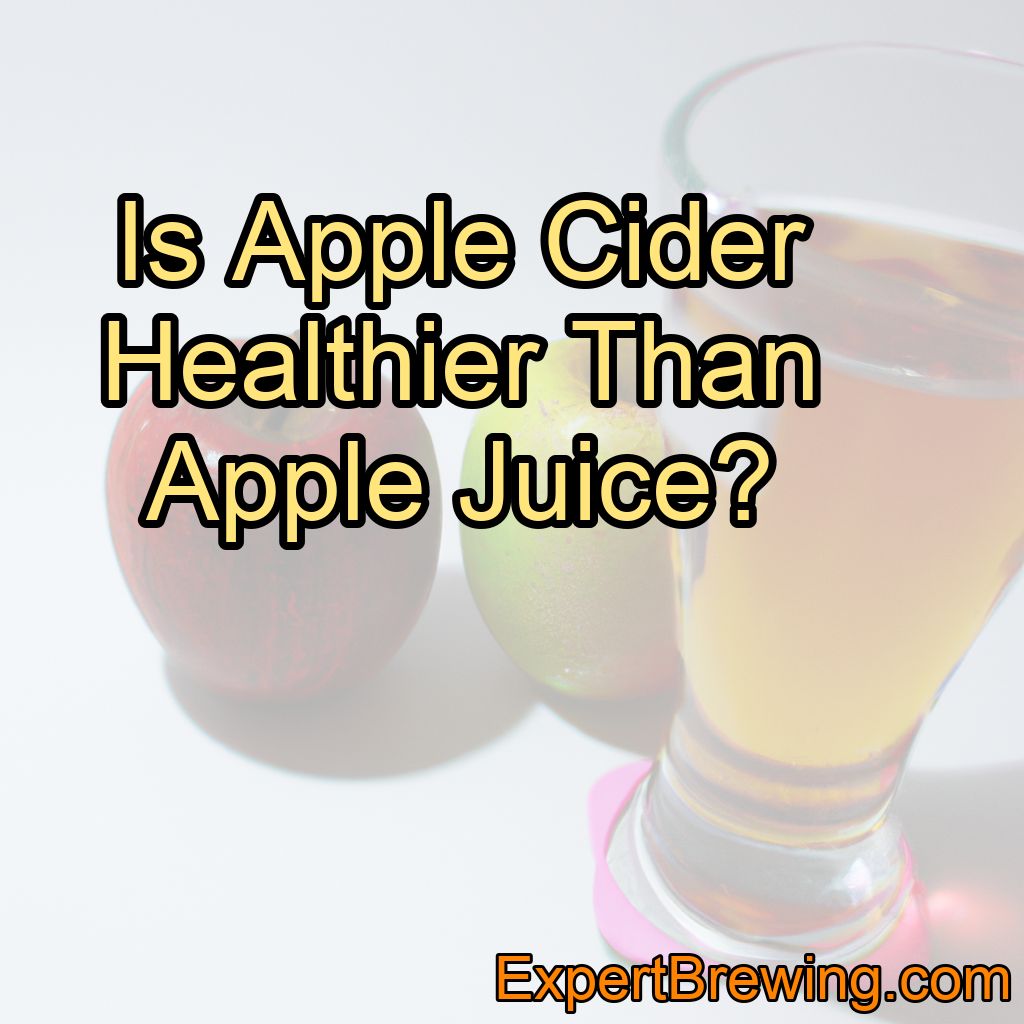Apple cider and apple juice have been enjoyed by people around the world for centuries. They both have their unique flavor profiles and benefits, but many people wonder which one is the healthier option. In this blog post, we will dive deep into the differences between apple cider and apple juice, and discuss their nutritional values, health benefits, and potential drawbacks.
As an expert brewer and someone who has been experimenting with various apple-based beverages for years, I have developed a personal connection with both apple cider and apple juice. I’ve spent countless hours in the kitchen and at the brewing station, perfecting my recipes and understanding the intricacies of these two popular drinks. I’m excited to share my knowledge and experience with you to help answer the question: is apple cider healthier than apple juice?
To answer the main question concisely: apple cider is generally considered to be healthier than apple juice, mainly because it contains more nutrients and antioxidants, and has less sugar and calories.
What is Apple Cider?
Apple cider is a raw, unfiltered beverage made from crushed apples. It is usually non-alcoholic, although it can be fermented to create alcoholic cider, commonly referred to as hard cider. The process of making apple cider involves pressing apples to release their juice, which is then left to ferment for a short period. This natural fermentation process gives apple cider its cloudy appearance and distinct, tangy flavor.
Nutritional Values of Apple Cider
Apple cider is rich in antioxidants, vitamins, and minerals. It contains a good amount of vitamin C, potassium, and iron, along with other essential nutrients. Additionally, apple cider is an excellent source of polyphenols, which are powerful antioxidants that help protect the body against oxidative stress and inflammation.
Calories and Sugar Content
Apple cider is relatively low in calories and sugar compared to apple juice. A typical 8-ounce serving of apple cider contains around 120 calories and 28 grams of sugar, whereas the same amount of apple juice contains about 114 calories and 24 grams of sugar. While the difference in calories and sugar might not seem significant, consuming apple cider in moderation can be a healthier alternative to apple juice for those looking to reduce their calorie and sugar intake.
What is Apple Juice?
Apple juice is a clear, filtered beverage made from the juice of apples. It is typically pasteurized to kill any harmful bacteria and extend its shelf life, and often contains added sugars and preservatives to enhance its taste and appearance. Apple juice can be made from concentrate or freshly squeezed, but it is always processed to remove any solids and impurities, giving it a uniform, clear appearance.
Nutritional Values of Apple Juice
Although apple juice does contain some vitamins and minerals, it lacks the antioxidants and polyphenols found in apple cider. The pasteurization and filtration processes involved in making apple juice remove much of the natural nutrients, resulting in a less nutritious beverage compared to apple cider.
Calories and Sugar Content
As mentioned earlier, apple juice generally has a higher calorie and sugar content than apple cider. The added sugars in apple juice can contribute to weight gain, tooth decay, and other health issues when consumed in excess. Additionally, the lack of antioxidants and other beneficial nutrients in apple juice makes it a less healthy option compared to apple cider.
Health Benefits of Apple Cider
There are several health benefits associated with consuming apple cider, including:
Antioxidant Properties
Apple cider is packed with polyphenols, which are powerful antioxidants that help protect the body against oxidative stress, inflammation, and chronic diseases. These antioxidants can also support a healthy immune system and promote overall well-being.
Heart Health
Some studies have suggested that consuming apple cider may help lower the risk of heart disease due to its antioxidant and anti-inflammatory properties. Additionally, potassium, which is found in apple cider, is known to help maintain healthy blood pressure levels.
Digestive Health
Apple cider contains pectin, a soluble fiber that can help promote healthy digestion by providing bulk to the stool and preventing constipation. Pectin can also help regulate blood sugar levels and support weight management.
Potential Drawbacks of Apple Cider
While there are many health benefits to consuming apple cider, there are also some potential drawbacks to consider:
Bacterial Contamination
Unpasteurized apple cider can contain harmful bacteria, such as E. coli or Salmonella, which can cause foodborne illnesses. It is important to only purchase apple cider from reputable sources and ensure it has been properly stored and handled to minimize the risk of contamination.
Allergies and Intolerances
Some individuals may be allergic to apples or have difficulty tolerating the high fructose content in apple cider. If you suspect you may have an apple allergy or fructose intolerance, it is best to consult with a healthcare professional before consuming apple cider.
Health Benefits of Apple Juice
While apple juice may not be as nutritious as apple cider, it does offer some health benefits:
Hydration
Apple juice can be a refreshing and hydrating beverage, especially when consumed in moderation. It can help replenish fluids and electrolytes lost through sweating or exercise.
Vitamin C
Apple juice does contain some vitamin C, which is important for a healthy immune system and collagen production. However, the vitamin C content in apple juice is generally lower than that in apple cider.
Potential Drawbacks of Apple Juice
There are also some potential drawbacks to consuming apple juice:
High Sugar Content
As mentioned earlier, apple juice often contains added sugars and has a higher sugar content than apple cider. Excessive sugar consumption can lead to weight gain, tooth decay, and other health issues.
Lack of Antioxidants and Nutrients
Apple juice lacks many of the antioxidants and nutrients found in apple cider due to the pasteurization and filtration processes. This makes apple juice a less nutritious option compared to apple cider.
Conclusion
In conclusion, apple cider is generally considered to be healthier than apple juice, due to its higher nutrient and antioxidant content, and lower sugar and calorie content. To sum up, here are ten facts about apple cider and apple juice:
1. Apple cider is made from raw, crushed apples, while apple juice is made from filtered apple juice.
2. Apple cider contains more antioxidants, vitamins, and minerals than apple juice.
3. Apple cider has a lower sugar and calorie content compared to apple juice.
4. Apple cider is a good source of polyphenols, which are powerful antioxidants.
5. Apple cider can support heart health, digestive health, and overall well-being.
6. Unpasteurized apple cider can contain harmful bacteria, so it’s important to purchase from reputable sources.
7. Apple juice can provide hydration and some vitamin C, but lacks many of the nutrients found in apple cider.
8. Apple juice often contains added sugars, which can contribute to weight gain and other health issues.
9. The pasteurization and filtration processes involved in making apple juice remove many of its natural nutrients.
10. When choosing between apple cider and apple juice, always consider your personal health needs and preferences, and consume in moderation.
FAQs
Does apple juice and apple cider taste the same?
No, apple juice and apple cider do not taste the same. Apple juice is filtered and pasteurized, resulting in a clear, sweet, and consistent flavor. Apple cider, on the other hand, is unfiltered and unpasteurized, giving it a cloudy appearance and a more complex, tangy taste with hints of spices and apple solids.
How do I substitute apple cider in a recipe?
To substitute apple cider in a recipe, you can use apple juice or a combination of apple juice and vinegar in equal parts.
Is it better to cook with apple cider or apple juice?
It depends on the recipe and personal preference. Apple cider has a more pronounced apple flavor and is typically less sweet than apple juice, which can be more subtle in flavor and higher in sugar content. However, apple juice can be a good substitute for apple cider in many recipes.
Is apple cider a good substitute for apple juice?
Apple cider can be a good substitute for apple juice, but it has a stronger and more complex flavor due to the fermentation process. It may also contain added spices or sugar. It is important to note that not all apple ciders are the same, so it is best to check the label and taste it before using it as a substitute.
Does apple juice taste like cider?
No, apple juice and cider have different taste profiles. Apple juice is typically sweeter and more refined, while cider has a more complex flavor with hints of spice and a slightly tangy taste.
What does apple cider taste like compared to apple juice?
Apple cider has a richer, more complex flavor than apple juice, with a slightly tangy and spicy taste due to the fermentation process. It also has a darker color and a slightly thicker consistency than apple juice.




-recipe.jpg)